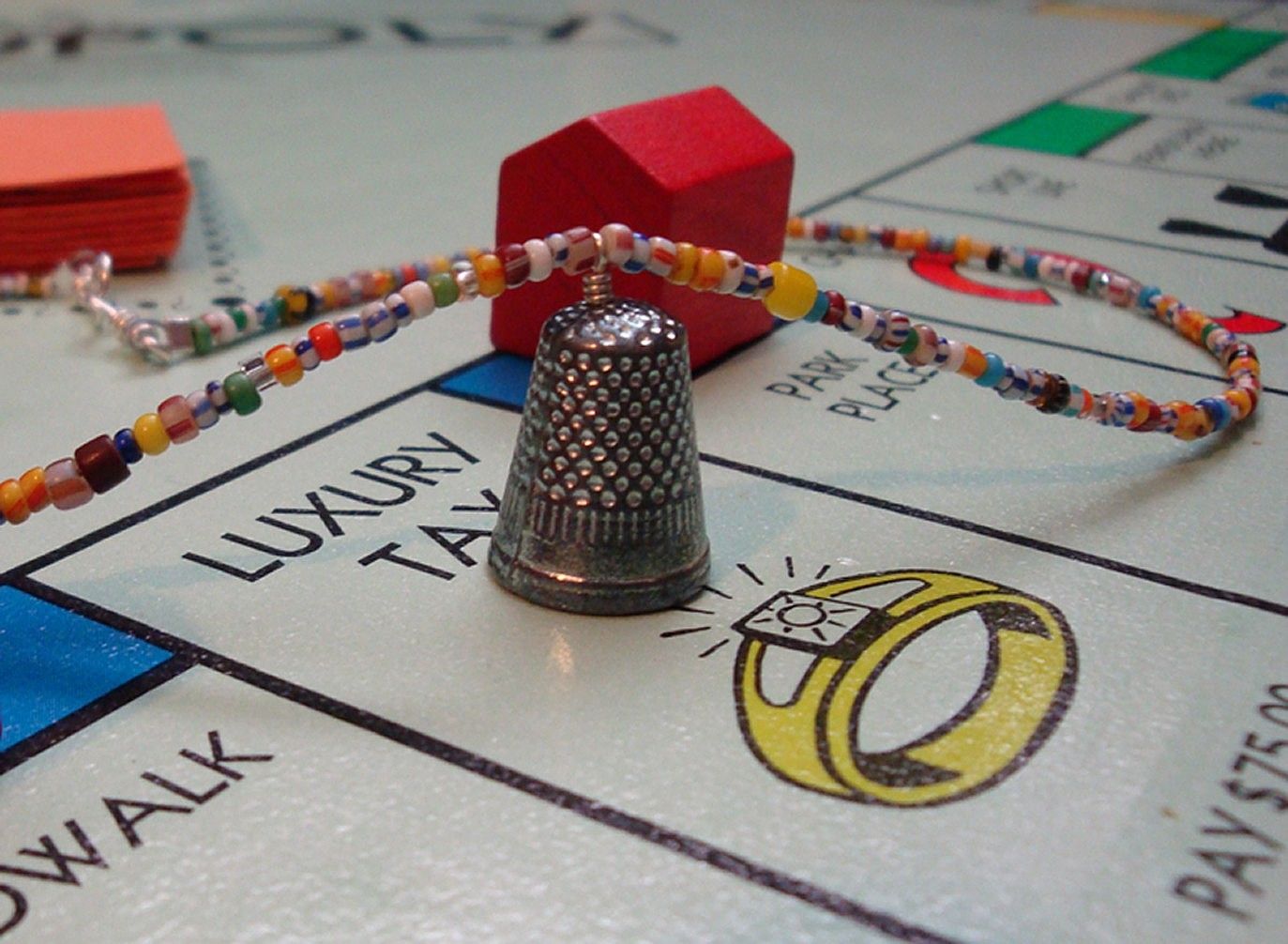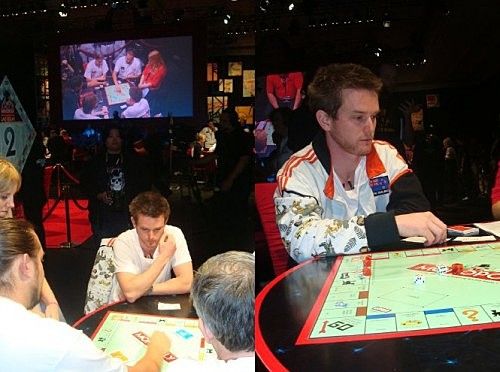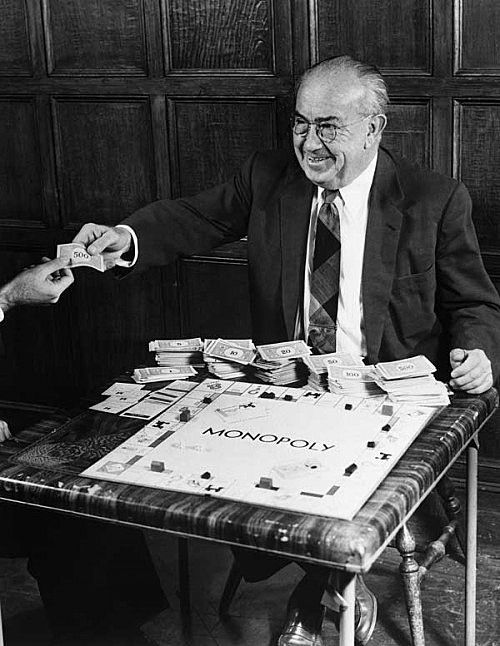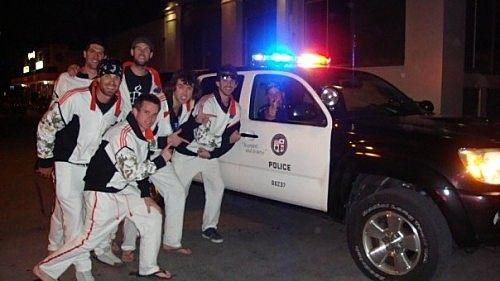The Battleship and The Thimble: A Glimpse Into The Monopoly World Championships
Greg Bruce meets the Auckland man who did pass go and reached the International Monopoly Championship - what motivates 'TNT', and competitive players of this most capitalist of games?
At the final table of the 2009 Monopoly World Championships at Caesars Palace Las Vegas, only three people between him and the world title and US$20,580 prize money, 25-year-old New Zealand champion Geoff Christopher, The Nimble Thimble, TNT for short because TNT goes boom, cheered on by 10 or 12 of his closest mates (largely hungover and all wearing matching white tracksuits made by his mate’s mum), locked down the last of the orange properties, said “Let’s go boys!” and sat back as shit got serious.
Earlier that year, having hardly played Monopoly since primary school, TNT had stumbled into the Auckland regional Monopoly champs at Whitcoulls Botany Downs as a substitute for a friend who was a last-minute withdrawal. His play in that tournament was immortalised in print by New Zealand Herald reporter Greg Dixon, who was also competing. Dixon portrayed TNT as a shark who played him big time in an important game, although Dixon won that game, so if he got played, and there’s a reasonable argument that he did, that’s some big playing right there.
TNT remembers Dixon as a real nice guy, which he thinks is important in Monopoly, but says he was maybe too nice, not aggressive enough. He describes his own playing philosophy as accumulate, negotiate, dominate, AND for short. After winning the Auckland championships, TNT took AND to the New Zealand championships, won, and was on his way to Las Vegas.
At the time of the world championships in Vegas, TNT was employed in risk management and he lived in Grey Lynn. The United States’ media was fascinated with him. Interviewers would ask him semi-relevant questions like his thoughts on the economy. “Yeah, I’d give them my thoughts,” he says. “I was all pumped up on coffee and still half boozed half the time.”
Sitting at that final table in Las Vegas, he had five microphones on his body, from ESPN and various other news and media outlets, all of them enthralled by the idea of a potential Monopoly world champion and what such a person might be like.
*
American champ Richard Marinaccio inexplicably beat out TNT as Jim Mora’s interview subject on Radio New Zealand on the day in early February this year that Monopoly’s makers Hasbro abandoned the iron as a playing piece and replaced it with a cat.
RNZ had earlier called TNT to ask him on Mora’s show, but called back and said they were going with Marinaccio instead. TNT thought it might have been because he’d used foul language when they’d first called him. in the end, he thought Marinaccio did a better job describing what competitive Monopoly is about than he could have anyway.
Talking to Mora, Marinaccio, a lawyer, said that many people have the wrong idea about Monopoly. They think it’s about building an empire. It’s not, he said, it’s about bankrupting other people.
In the documentary Under the Boardwalk, which follows TNT and his competition through the 2009 Monopoly world championships, the editor of BoardgameNews.com describes how Monopoly was originally invented as an anti-capitalist game, a celebration of what’s wrong with the system, that “one person eventually stands on top and throws all the money on top of their head and are like ‘I am awesome, I rule; you guys suck’”. But that message has subsequently somehow been co-opted into a narrative celebrating that same system, and the throwing of money on one’s head has somehow become a thing of beauty.
It’s a big time for Hasbro, Monopoly’s makers, right now. Apart from the publicity coup of the cat taking over from the iron, they’ve got the Monopoly Millions thing going at McDonalds. They’re probably doing well out of it. The descendants of Charles Darrow, the game’s sort-of inventor, have certainly done well. Darrow negotiated a deal for ongoing royalties from the game over 75 years ago and his grandson smirks happily about that in the movie.
To succeed in Monopoly, to be the eventual thrower of money, you have to know how to do a deal: “There’s a three or four minute window in any game in which all the players come together and once two players do a deal, the other two usually move fairly quickly,” TNT says. That’s the window in which the game is really decided. “You’re basically rolling dice after that. That’s all you’re doing.”
When Jim Mora asked Richard Marinaccio what qualities he brought to the game, Marinaccio said, “I understand people. I’m a good dealmaker.”
When I ask TNT what he likes about Monopoly he says, “It’s awesome bankrupting people” and adds that the key to that is projecting niceness while being ruthless. When I ask if that’s his strategy in real life, he says no.
He came up with the nickname ‘The Nimble Thimble’ while driving to that first competition in Auckland in 2009 and says he liked that it sounded a bit weak. In competition, he tries to build rapport with the others at the table and make himself as likeable as possible so they’re more likely to trade with him
“No one likes doing a deal with someone that comes across as a bit arrogant or a bit of an asshole,” he says. “Always have a smile on your face, keeping it fun. People are more likely to do a deal that’s favourable to you if they like you.”
He usually plays with the battleship though, because blown up to life size it would be the most powerful piece on the board. “You don’t want to be completely weak as piss,” he says. On Under the Boardwalk, he adds: “In reality, if a real battleship took on a top hat, it speaks for itself really”.
But can you honestly be both the battleship and the thimble? Is that a coherent position?
[caption id="attachment_6426" align="aligncenter" width="500"] Charles Darrow[/caption]
According to Under the Boardwalk, a forerunner of Monopoly called The Landlord’s Game was invented in the early 1900s. Its inventor, Lizzie Magie, tried to sell it to Parker Brothers in 1909 and again in 1923, but was rejected both times.
A professor at the Wharton School of Business in Philadelphia discovered it and started using it in classes, and a student passed it on to someone who passed it on to someone else and someone else and so on, then one night one of these people was out walking and ran into Charles Darrow, and Darrow took the game and he gussied it up and called it Monopoly and started hand-making copies. Sales built slowly, and he tried to sell the rights to Parker Brothers and Milton Bradley, but both said no.
Various people in Under the Boardwalk talk about Monopoly being a product of its time – the depression – and that it offered players hope and a focus on the future at a time when people were struggling with both. For sure that was also the case with Darrow.
He convinced a local store to start selling the game and sales got hot and word got back to Parker Brothers that they should really check it out. When they returned to Darrow to say they had reconsidered, according to his grandson in Under the Boardwalk, Darrow said, “That’s wonderful. I’ve reconsidered too,” and asked for the royalty agreement that benefits said grandson and other descendants still.
Obviously, there’s a lesson in this, and it’s delivered in the movie by Darrow’s grandson: “You should take with you his hard work and determination,” he says. “He was turned down by two very successful companies and still went on and went with it.”
“If you feel you can do it, keep pushing. But don’t forget the fun part either.”
What the fun part was for Darrow, we’re never really told.
*
45 countries competed in the 2009 world championships at Caesars Palace and on the final day there was Grey Lynn’s TNT in the final four, alongside Richard Marinaccio, Bjorn Halvard Knappskog from Norway and Oleg Korostelev from Russia.
“I’m not draggin’ my mates all around the world to come anywhere other than first,” TNT smirkingly said to the makers of Under the Boardwalk prior to the final. “On to victory. V day!”
The three-way deal happened early in the game, giving Russia and the USA and TNT a whole property set each, basically playing Norway out of the game. TNT, at the heart of it, with the orange group, came out of it hyped: “Let’s go boys! Let’s go!” “We’re dancing! We’re dancing!”
But to the amazement of the others, Russia then traded with Norway, gaining the red set, giving Norway the blue set, and putting Norway back in the game. Although it gave Russia two full property sets, he was out of cash, had nothing left to buy houses, and was soon bankrupt.
TNT now wishes he had said to Russia, “‘What are you doin’? Let’s keep this a three horse race!’
“If I’d done anything different it would have been that,” he says, “but I’d been two weeks on the piss and having a party and was a bit exhausted by the end of it all, so that might have been another mistake.”
Norway quickly built his lifeline into a position of dominance. “We may be playing for second,” TNT said to Richard Marinaccio. Then Richard Marinaccio went bust and TNT was playing for first.
[caption id="attachment_6423" align="aligncenter" width="500"] TNT and his team at Venice Beach, "having a laugh".[/caption]
TNT grew up on a farm in Te Awamutu, playing a decent amount of Monopoly with his two brothers until he was about 10 or 12. He studied economics and law at Canterbury University, moved to Auckland and, in 2009, shifted into a new flat in Grey Lynn and played about 20 games in a week with his flatmate and regularly thrashed him, but before that he’d hardly played in years.
That flatmate had entered the upcoming Auckland regional championships, but had to pull out to attend a wedding and wrote to organisers suggesting that TNT replace him.
The flatmate says now that TNT is a “lad’s lad”, very competitive, doesn’t lose at anything. But he also describes him as “a minimalist”: “Money’s not a big issue in his life,” he says. “He’s not a cutthroat, Wall Street type of guy.”
He says he sometimes half-jokingly tells TNT he should write a book about his theory on life, how to live happily, called ‘The Christopher Way’. He says he’s never seen TNT unhappy. “Things don’t affect him,” he says.
In any game of Monopoly, no matter the level, once the deals are done and the houses and hotels are built, the actual playing of the game becomes less important: It’s no longer about decisions and strategy; it’s a bunch of people with a common interest sitting around a table, rolling dice.
The chief judge of the world championships says, in Under the Boardwalk,that it’s what happens off the board that makes Monopoly so special, although that’s a statement many players at the world championships would probably disagree with – some of them have put together entourages of coaches, software packages, played thousands of games to get to this point, obsessed with winning the world title.
Today, more than three years on, TNT doesn’t especially like watching footage of that world championship final. When he talks about that time in his life, he’s more passionate about what happened off the board – the week before the competition that he spent with his mates, driving down the west coast of the USA to Mexico, a Kiwi flag and a pirate flag flying off the back of their campervan, a dozen friends in ludicrous matching outfits, all bigging him up at the bar and wherever else they went and generally just living large.
“We got there and thought it would be a funny, pisstake kind of thing,” his former flatmate says. “You know, it’s the Monopoly world champs. But some people get really serious. It wasn’t like that for Geoff at all. It was a really awesome time. The Monopoly was just the catalyst for it all happening.”
Nobody else had an entourage like TNT’s. Norway’s cheering section in the film is identified in a cutaway as ‘Bjorn’s friend’. Besides, Bjorn was still a teenager and couldn’t legally drink, and his first phone call after the tournament was apparently to his mum.
“I wouldn’t have done anything differently,” TNT says. “I was glad that in the end 10 of my best mates did this awesome trip down the west coast, awesome trip to Vegas, had a great time. I stand by it. I’d rather have done that and come second than won and gone with my mum.”
Some of his friends went home from the trip and immediately quit their jobs he says, found other things to do with their lives. They’re all still mates.
He doesn’t play Monopoly much anymore. He’s spent most of the past year travelling the world and has just arrived in the United Kingdom to interview for jobs that pay up to GBP600 a day, helping banks clean up the mess made as a result of bad deals leading up to the global financial crisis.
He plans to save his earnings and use them for more travelling. He doesn’t have a life plan and never has, and thinks ahead in six and 12 month blocks. He says he believes in accumulating experiences more than possessions although he wonders if that may just be because he doesn’t have many possessions.
Keep pushing, but don’t forget the fun part, Charles Darrow’s grandson said, and that is both sweet, sweet platitude and gross oversimplification. Capitalism is competition, for which pushing is a prerequisite, but competition offers no incentive for the having of fun.
Whether it matters that TNT didn’t win the title of world champion or the US$20,580 prize money depends what you mean by the question: ‘Does it matter?’ It would have been a good feeling and a great party, sure, but he would have probably thrown some money in the air, maybe said ‘I rule; you guys suck’, and a week later all that would have remained was a memory of a good time.
*
He got himself into jail late in the game and for a moment it seemed like, if the dice kept rolling for him, and Norway kept landing on his properties, he might somehow get back on top. But then Norway went to jail, TNT got out of jail, landed on two consecutive Norwegian hotels, and all of a sudden he was bankrupt.
“She’s all over. Well done,” he said, shaking hands with Norway magnanimously, not even looking especially disappointed for someone who, with one sharp bit of negotiation, one final push, could have earned US$20,580 and a world title, and all the what-ifs that go with that. Then he got up and slapped hands with his tracksuited, hungover, half-boozed crew. “If you’re not first, you’re last boys,” he said, smiling, and then they were off to the after-party.
*
TNT is not at all easy to figure out. The day we meet, he’s wearing board shorts and jandals, and sunglasses on top of his head and he says his hair would be tidier if he was going for a job interview.
His image can be found on a webpage www.legpion.com which discusses the etymology of the word ‘legpion’ – a combination of the words ‘legend’ and ‘champion’ – which appears to have been invented by TNT himself to describe himself, although this is all only hinted at on the webpage. The photo of him that appears on that page shows him sitting on what appears to be the rooftop of a Las Vegas bar, looking pretty suave, combining white leather moccasins, tailored grey suit and open neck shirt.
A friend of mine, on reading an early draft of this article, wrote to me: “I don't trust salesmen. I don't trust people working in finance. He's both of these. You present him in this weird positive light and I don't buy it. You know how he says ‘People are more likely to do a deal that's favourable to you if they like you’? Well, do you like him? And are you doing him a favourable deal?”
This is a good question, a sound question, a question that is impossible to answer. If he’s as good a dealmaker as I think he is, how would I ever know? There’s a reason he reached the final two in the world championship in Monopoly – a game he doesn’t even much care for – and it’s not that he’s lucky with dice.
We all sell favourable versions of ourselves, versions that may not necessarily reflect who we are, or at best reflect an incomplete and distorted version of ourselves. When people like us, they like us not for who we are, but for who we have convinced them we are. In life, as in Monopoly, there may be no more important skill than being convincing. Are you a battleship or a thimble? You’re both; you’re neither; you’re somewhere in between.
The Legpion webpage can be read as either the pretentious self-indulgence of the aggressive young capitalist or the tongue-in-cheek mock-pretension of a 20-something lad’s lad having a laugh with his mates in the middle of one of the most bizarre experiences of his life. Maybe it’s both; maybe it’s neither; maybe it’s somewhere in between.
For what it’s worth, I do like TNT. And I probably am doing him a favourable deal, but it’s a deal he had to sell me on.




